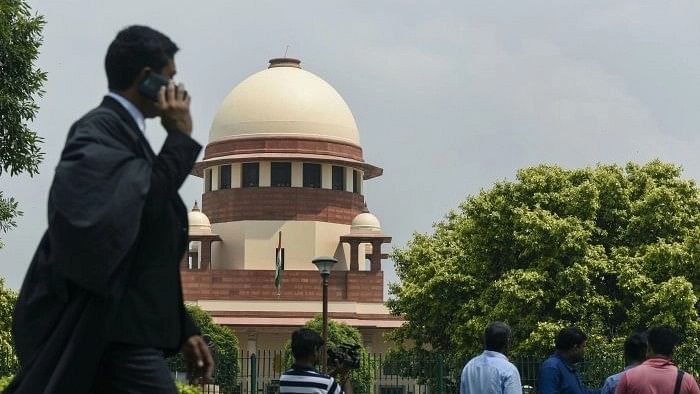
A view of the Supreme Court.
Credit: PTI Photo
New Delhi: The Supreme Court on Monday said a deeper scrutiny of charges of sexual harrasment at workplace is to be undertaken when a plea of false accusation is made as the charge of this nature is very easy to make and very difficult to rebut.
A bench of Chief Justice of India D Y Chandrachud and Justices J B Pardiwala and Manoj Misra said sexual harassment in any form at the work place must be viewed seriously and the harasser should not be allowed to escape from the clutches of law.
"We say so because the same humiliates and frustrates a victim of sexual harassment, more particularly when the harasser goes unpunished or is let off with a relatively minor penalty," the bench said.
The court said when a plea is taken of false implication for extraneous reasons, the courts have a duty to make deeper scrutiny of the evidence and decide the acceptability or otherwise of the accusations, in order to separate the chaff from the grain.
"The veracity and genuineness of the complaint should be scrutinised to prevent any misuse of such laudable laws enunciated for the upliftment of the society and for equal rights of people without gender discrimination by anybody under the garb of “sexual harassment”, lest justice rendering system would become a mockery," the bench said.
The top court set aside Gauhati High Court's judgment of May 15, 2019 which quashed the decision to withhold 50 per cent pension of Dilip Paul, a retired DIG in Sashtra Seema Bal due to 2011 complaint of sexual harassment of a subordinate woman officer.
The bench found the HC committed egregious errors in its judgement.
It said the High Court’s reasoning that as the Central Complaints Committee was constituted on the basis of the first complaint, its scope of inquiry was restricted to its content, is completely erroneous.
The bench also said it was quite preposterous for the HC to hold that the complainant was precluded from making the second complaint before the Central Complaints Committee merely because she had already made one complaint to the IG, Frontier Headquarters, Guwahati.
It also rejected the HC's finding that the complaints committee could not have put questions to witnesses.
"There appears to be neither any statutory bar nor any logic to restrict the power of the complaints committee to put questions to the witnesses only to the context. The complaints committee being an inquiry authority and in some sense equivalent to a presiding officer of the court must be allowed to put questions on its own if a proper, fair and thorough inquiry is to take place," it said.
With regard to contention that no call recordings were placed on charge of making unsolicited phone calls to the complainant, the bench said it was due to the fact that the complainant’s grievances were undertaken after a lapse of significant time.
